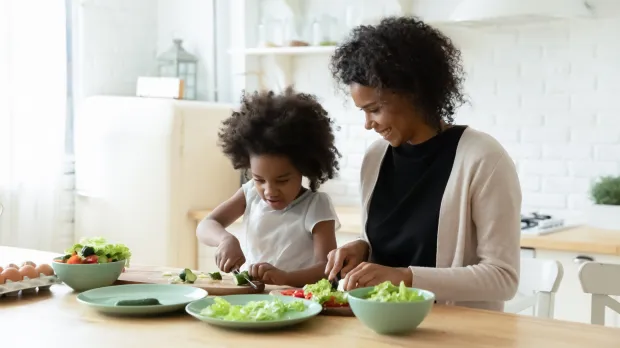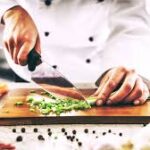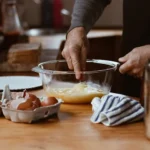Cooking is a fundamental skill that can make a significant difference in the quality of your meals, your health, and your overall lifestyle. Whether you’re a beginner looking to master the basics or an experienced cook aiming to elevate your skills, improving your cooking abilities at home requires practice, patience, and a willingness to learn. In this article, we will explore various tips and strategies that can help you become a better cook at home, from mastering essential cooking techniques to exploring new ingredients and cuisines.
1. Master the Basics
The first step in improving your cooking skills is to get comfortable with the basics. Understanding the fundamental techniques and kitchen skills will provide a solid foundation for more advanced cooking. Here are some essential skills to master:
- Knife Skills: Proper knife skills can make a huge difference in how efficiently and safely you cook. Learning how to chop, dice, slice, and julienne vegetables, herbs, and meats will not only speed up your prep time but also improve the consistency and presentation of your dishes.
- Basic Cooking Techniques: Learn the core cooking methods such as sautéing, boiling, roasting, grilling, and baking. These techniques form the basis of many recipes, and once you’re comfortable with them, you’ll find it easier to follow more complicated dishes.
- Understanding Heat: Knowing how to control heat is crucial. Whether you’re searing meat, sautéing vegetables, or simmering sauces, the right temperature can make all the difference. For example, a high heat is ideal for searing meat, while a low simmer is best for cooking delicate sauces or soups.
2. Invest in Quality Tools
While skill is important, having the right tools can make a world of difference in your cooking. Investing in quality kitchen tools will make your tasks more efficient, precise, and enjoyable. Some essential items include:
- Sharp Knives: A sharp knife makes cutting easier, safer, and more precise. Invest in a good chef’s knife, paring knife, and serrated knife for various tasks.
- Quality Cookware: A good set of pots, pans, and skillets is crucial. Cast iron skillets, non-stick pans, and stainless-steel pots are all versatile and long-lasting options. They help distribute heat evenly, preventing overcooking or burning.
- Measuring Tools: Accurate measurements are important for both savory and sweet dishes. Invest in measuring spoons, cups, and a kitchen scale for precise portions.
- Thermometers: A food thermometer can help ensure that your meats and baked goods are cooked to the perfect temperature, preventing undercooking or overcooking.
3. Follow Recipes, but Get Creative
When you’re learning to cook, following recipes is key. They provide structure and guidance, helping you understand techniques and combinations of flavors. However, as you become more comfortable in the kitchen, don’t hesitate to get creative and tweak recipes to your liking. Here’s how you can balance following recipes and being creative:
- Start with Simple Recipes: Begin with recipes that are easy to follow and use familiar ingredients. As you become more skilled, you can move on to more complex dishes.
- Experiment with Ingredients: Once you’re comfortable with a recipe, try swapping ingredients based on what’s available or what you prefer. For example, substitute different herbs, vegetables, or proteins. This will allow you to experiment and find flavors that work best for you.
- Adjust Seasonings: Seasoning is a crucial part of cooking. Don’t be afraid to adjust the amount of salt, pepper, spices, or herbs to suit your taste. Start small and taste as you go to avoid over-seasoning.
4. Learn How to Balance Flavors
Understanding how to balance the five fundamental tastes—sweet, salty, sour, bitter, and umami—is key to elevating your cooking. Here are some tips on balancing flavors:
- Sweet: Use ingredients like sugar, honey, or fruits to add sweetness. Sweetness can balance acidity or bitterness in a dish, and can be adjusted depending on the dish’s overall flavor profile.
- Salty: Salt enhances the flavors of the ingredients in your dish. Use it sparingly and taste as you go. Don’t forget to season at different stages of cooking.
- Sour: Citrus, vinegar, and fermented foods add a tangy flavor that can brighten up a dish. A little acidity can help cut through richness, particularly in fatty foods like meats or creams.
- Bitter: Bitter flavors, such as from leafy greens, coffee, or certain spices, can add depth to your cooking. Balance bitterness with sweetness or acidity.
- Umami: Umami, the savory taste, can be found in ingredients like tomatoes, cheese, soy sauce, and mushrooms. Incorporating umami-rich foods can elevate the depth of your dishes.
5. Practice Mise en Place
Mise en place is a French term that translates to “everything in its place.” It refers to the practice of preparing and organizing all your ingredients before you begin cooking. This is a game-changer when it comes to improving your cooking efficiency and overall success. Here’s how to implement mise en place:
- Prep Ingredients in Advance: Measure and chop all ingredients before you start cooking. This helps you avoid rushing through steps and ensures that you’re prepared for each stage of cooking.
- Organize Tools and Utensils: Keep your knives, spatulas, and other tools within arm’s reach. Having everything ready will prevent unnecessary interruptions and allow you to focus on the cooking process.
- Clean as You Go: Keep your workspace clean and organized to avoid distractions. Cleaning up between tasks helps keep your focus on the recipe and reduces the mess at the end.
6. Learn to Cook with Seasonal Ingredients
Cooking with fresh, seasonal ingredients not only enhances the flavor of your dishes but also makes your meals more cost-effective and sustainable. Seasonal produce is often cheaper and tastier than out-of-season varieties. Here’s why cooking seasonally can improve your cooking skills:
- Flavor: Seasonal produce is often fresher and more flavorful, which can elevate the taste of your dishes.
- Nutrition: Fresh, in-season ingredients tend to retain more nutrients, making your meals healthier.
- Variety: Using seasonal ingredients forces you to experiment with different foods, expanding your culinary knowledge and encouraging creativity in your cooking.
7. Take Cooking Classes or Watch Tutorials
One of the best ways to improve your cooking skills is by learning from experts. If you want to enhance your cooking techniques, consider the following:
- Online Cooking Classes: Many platforms offer affordable online cooking classes that cover everything from basic techniques to advanced culinary skills.
- YouTube Tutorials: YouTube is a treasure trove of free cooking tutorials. You can watch professionals or home cooks share their recipes and techniques. This can give you new ideas and inspire you to try something new.
- Cookbooks: Invest in cookbooks that focus on the skills or cuisines you’re interested in. Cookbooks not only provide recipes but also teach you about techniques, flavors, and presentation.
8. Taste and Adjust
One of the most crucial aspects of cooking is learning to taste and adjust your dishes as you cook. Don’t be afraid to taste your food at every stage of preparation. Here’s how to adjust:
- Seasoning: Add salt, pepper, and other seasonings gradually, tasting as you go to ensure the dish is balanced.
- Textures: Pay attention to the textures of your ingredients. You want vegetables to be tender but not mushy, and meats should be cooked to the right level of doneness.
- Flavors: If a dish feels too salty, add a bit of sugar or vinegar to balance the flavor. Experiment with acidity, sweetness, and spices to find the perfect harmony of tastes.
FAQs
1. How can I improve my cooking if I’m a beginner?
Start with simple recipes, practice basic techniques like chopping and sautéing, and invest in essential kitchen tools. Be patient and learn from your mistakes.
2. How important is knife skills in cooking?
Knife skills are essential for efficiency, safety, and the presentation of your dishes. Learning to chop, slice, and dice correctly will save you time and help your dishes look professional.
3. What is the best way to practice mise en place?
Before cooking, measure and prepare all your ingredients and organize your tools. This practice ensures that you can focus on cooking rather than scrambling for ingredients.
4. How do I know when a dish needs more seasoning?
Taste your dish throughout the cooking process. If it feels flat, try adding salt, pepper, or other spices to balance the flavors. A small pinch of sugar or vinegar can also enhance the overall taste.
5. Should I follow recipes exactly or experiment?
While following recipes helps you learn, don’t be afraid to experiment once you feel comfortable. Substituting ingredients and adjusting seasonings to your taste can lead to more personal and unique dishes.
6. How can I learn advanced cooking techniques?
Consider taking online cooking classes, watching tutorials, or reading cookbooks that focus on specific techniques like sous-vide, fermentation, or advanced baking.
7. How can I make my meals healthier?
Use fresh, seasonal ingredients, reduce the amount of processed food in your meals, and experiment with healthier cooking methods like grilling, steaming, or roasting instead of frying.
Conclusion
Improving your cooking skills at home is an exciting and rewarding journey. By mastering the basics, investing in quality tools, and practicing essential techniques like mise en place, knife skills, and flavor balancing, you can enhance your cooking and make meals that are both delicious and impressive.
With the right mindset, creativity, and commitment, anyone can become a better cook. Whether you’re experimenting with new ingredients or honing your skills in a particular cuisine, the key is to keep learning, stay curious, and never be afraid to make mistakes along the way.
Key Takeaways
- Master the Basics: Learn essential techniques like knife skills and basic cooking methods to build a solid foundation.
- Invest in Quality Tools: Proper kitchen equipment, including sharp knives and cookware, is crucial for efficiency and precision.
- Balance Flavors: Understanding how to balance sweet, salty, sour, bitter, and umami flavors can elevate your cooking.
- Practice Mise en Place: Organizing ingredients and tools before cooking helps improve efficiency and reduces stress.
- Be Creative: Experiment with ingredients and recipes to add your personal touch to each dish.
- Learn Continuously: Take classes, watch tutorials, and read cookbooks to improve your skills and broaden your culinary knowledge.
Improving your cooking at home is a gradual process, but with practice, you’ll find yourself creating meals that are both satisfying and delicious.




